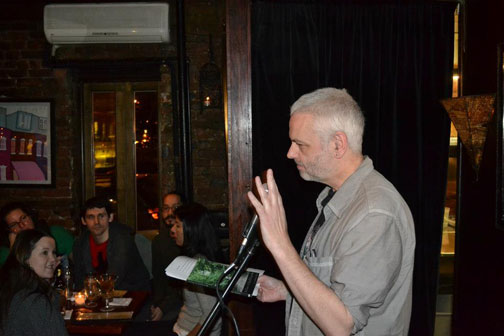


SERVICES
Tuesday April 2, 2013
"As Close As You'll Ever Be" Is Too Close For Comfort
Seamus Scanlon reading from his book, 'As Close As You'll Ever Be' By Gwen Orel Ever wonder what it's like to think like a killer? Seamus Scanlon clearly has. His collection of stories, "As Close As You'll Ever Be," explores the minds of I.R.A. assassins, bank robbers, grown victims of child abuse out for revenge, and other damaged souls who generally kick someone in the teeth or shoot someone in the head before the story ends. They are beautifully written little shocks of insight and cruelty. Scanlon has an elegant way around a sentence. Take, for example, this from "The Long Wet Grass": "The wind kept trying to tailgate us." That story is quite short, a reverie of observation from the driver of a car holding a doomed prisoner. Other sentences are full of zoff-bang-boom shock: "He was pulling a shotgun from under the couch, fumbling it, sweating it, blood dripping on the dark gray barrels." That's from "All in the Mind," in which two Irish thugs in New York debate whether illness is all in the mind, just before they kill a Dominican. Like thugs in many films, Scanlon's criminals often have philosophical streaks and interesting insights which, however, don't stop their brutality nor slow it down. Sometimes the stories feel like what Christopher from "The Sopranos" would write, if he could write: occasionally self-pitying slices of life in the bildungsroman of a killer. It's compelling to be on a narrator's side at first, as we are when the narrator is a child, as in "Free-Fall," and then realize this narrator is going to turn out to be a thug. After a while, though, that just becomes the way it goes, and is less shocking, and less persuasive. It's almost disappointing when Scanlon's taut language takes us to yet another killing. Scanlon also likes to end stories with a tossed-off observation, like "Some of those nuns were hot." That works about half of the time. You might not want to read all of these stories in a clip. That might be too close for comfort. The explosions of violence work best when considered individually, rather than bumping up next to one another. The most powerful stories make use of violence rather than try to shock with it, showing us complex individuals trapped in a dangerous world. "The Butterfly Love Song" is a beautiful piece, with danger lurking in it, showing us a young boy's first love and withholding just enough information to set our teeth on edge. This story won Scanlon the 2010 Over the Edge New Writer of the Year Contest, and was published as "Lucy Black Waited" in "The Review of Post Graduate English Studies" in 2011, according to the book credits. Look at this description: "I avoided direct contact with girls. I don't know where boys are from, but girls are from Cubist, a planet out of my constellation. Girls scope out the skies of emotion and elegance on elliptical orbits that I can't track." Gorgeous stuff. The narrator's suspicious about why Lucy's asked him over - and we're not sure ourselves. The story ends with real menace. Another stand-out is "On Her Birthday," a story filled with pain, but not blood and guts, as a man takes his mother, once a nurse, now an old lady with dementia, out of the nursing home for her birthday. "Her wild Irish hair felt like the rough gorse bushes all around them." It's the final story in the collection, and a killer-in the best sense. Gwen Orel runs the blog and podcast, New York Irish Arts. |
CURRENT ISSUE

RECENT ISSUES


SYNDICATE
[What is this?]
POWERED BY

HOSTED BY

Terms of Service | Privacy Policy
Website Design By C3I






